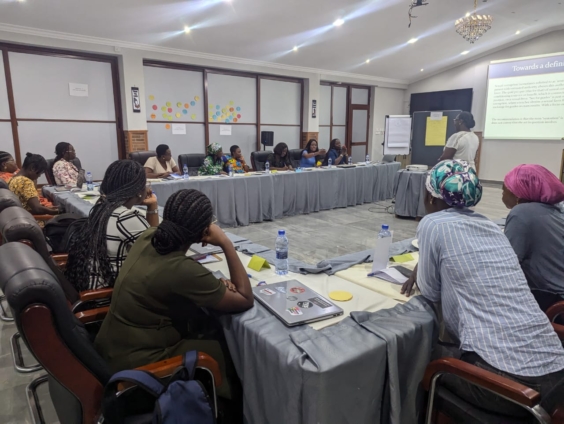Journalists Trained on Reporting Sexual Corruption in Ghana
Friday, 29 November 2024 | Ghana

Sexual corruption, a pervasive yet underreported issue in many sectors of society, was the focus of a specialized training program designed to equip journalists with the tools to report on the topic accurately and sensitively. Organized as part of the Media Foundation for West Africa’s capacity-building initiative on gender-sensitive reporting, the workshop aimed to empower journalists with the skills necessary to address sexual corruption from a gender-sensitive perspective.
Supported by PAIReD, a program funded by GIZ and co-financed by the European Union, the training highlighted the importance of addressing sexual corruption, which often goes unnoticed due to the failure to recognize it as a form of corruption. Harriet Gyan, Component Manager for Civil Society and Media at PAIReD, underscored that sexual corruption, such as the exchange of sexual favors for employment or academic opportunities, should be viewed and treated in the same way as bribery.
“Sexual corruption often goes unnoticed because people fail to recognize it as a form of corruption. When someone is asked to exchange sexual favors for employment or academic opportunities, it is corruption, just like bribery. This training is part of our efforts to spotlight this issue and equip journalists to combat it,” Harriet Gyan explained.
The workshop focused on the pivotal role journalists play in shaping public perceptions and encouraged participants to use their platforms to contribute to the fight against sexual corruption. Harriet called on media professionals to develop policies within their organizations that would address sexual harassment and create supportive environments for victims to come forward.
Dr. Aurelia Ayisi, a lecturer at the University of Ghana’s Department of Communication Studies and one of the facilitators, emphasized the importance of education and awareness in tackling sexual corruption. She called on participants to use their knowledge to inform the public, ensuring accountability and sparking societal change.
“Education and awareness are the low-hanging fruits, but they remain important gaps in tackling sexual corruption. Media coverage must frame these issues to enlighten audiences and ensure accountability,” Dr. Ayisi stated. She encouraged journalists to utilize their platforms during the 16 Days of Activism Against Gender-Based Violence, with sexual corruption as a focal point.
Rebecca Ekpe, News Editor at the Ghana Broadcasting Corporation and another facilitator, emphasized the need for institutions to enforce strict penalties for perpetrators of sexual corruption. She pointed out that awareness campaigns and clear reporting mechanisms are vital, as many victims suffer in silence due to fear of retaliation.
“Empowering students and employees with knowledge and support systems is necessary for change,” Rebecca said, further stressing the importance of collaboration between media and civil society in eradicating sexual corruption. She added, “This is a fight for equity, trust, and dignity in Ghana. By working together, we can expose perpetrators and ensure that these practices are no longer normalized.”
The training provided a platform for participants to share strategies for tackling sexual corruption in their fields. It also offered guidance on leveraging legal frameworks and organizational policies to create safer environments. Many participants expressed their commitment to applying the skills learned to their work, acknowledging the significance of such workshops in equipping journalists to address sensitive issues effectively.


 How to resolve AdBlock issue?
How to resolve AdBlock issue?